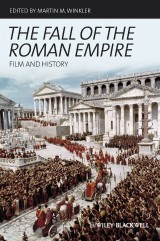Details

The Fall of the Roman Empire
Film and History2. Aufl.
|
36,99 € |
|
| Verlag: | Wiley-Blackwell |
| Format: | EPUB |
| Veröffentl.: | 18.12.2012 |
| ISBN/EAN: | 9781118589816 |
| Sprache: | englisch |
| Anzahl Seiten: | 352 |
DRM-geschütztes eBook, Sie benötigen z.B. Adobe Digital Editions und eine Adobe ID zum Lesen.
Beschreibungen
The essays collected in this book present the first comprehensive appreciation of <i>The Fall of the Roman Empire</i> from historical, historiographical, and cinematic perspectives. The book also provides the principal classical sources on the period. It is a companion to <i>Gladiator: Film and History</i> (Blackwell, 2004) and <i>Spartacus: Film and History</i> (Blackwell, 2007) and completes a triad of scholarly studies on Hollywood’s greatest films about Roman history. <ul> <li>A critical re-evaluation of the 1964 epic film <i>The Fall of the Roman Empire,</i> directed by Anthony Mann<i>,</i> from historical, film-historical, and contemporary points of view</li> <li>Presents a collection of scholarly essays and classical sources on the period of Roman history that ancient and modern historians have considered to be the turning point toward the eventual fall of Rome</li> <li>Contains a short essay by director Anthony Mann</li> <li>Includes a map of the Roman Empire and film stills, as well as translations of the principal ancient sources, an extensive bibliography, and a chronology of events</li> </ul>
<p>List of Illustrations vii</p> <p>Notes on Contributors ix</p> <p>Editor's Preface xii</p> <p>1. A Critical Appreciation of <i>The Fall of the Roman Empire</i> 1<br /><i>Martin M. Winkler</i></p> <p>2. History, Ancient and Modern, in <i>The Fall of the Roman Empire</i> 51<br /><i>Allen M. Ward</i></p> <p>3. Marcus Aurelius: The Empire Over Himself 89<br /><i>Diskin Clay</i></p> <p>4. Was Commodus Really That Bad? 102<br /><i>Eleonora Cavallini</i></p> <p>5. East and West in <i>The Fall of the Roman Empire</i> 117<br /><i>Jan Willem Drijvers</i></p> <p>6. Empire Demolition 130<br /><i>Anthony Mann</i></p> <p>7. Excerpts from the American Souvenir Program of <i>The Fall of the Roman Empire</i> 136</p> <p>1. A Prologue by Will Durant 137</p> <p>2. The Roman Forum: In Ruins Today . . . and Re-Created 139</p> <p>3. An Epilogue 143</p> <p>8. Edward Gibbon and <i>The Fall of the Roman Empire</i> 145<br /><i>Martin M. Winkler</i></p> <p>9. Fact, Fiction, and the Feeling of History 174<br /><i>Martin M. Winkler</i></p> <p>10. Peace and Power in <i>The Fall of the Roman Empire</i> 225<br /><i>Ward W. Briggs, Jr.</i></p> <p>11. The Politics of <i>The Fall of the Roman Empire</i> 241<br /><i>Peter W. Rose</i></p> <p>12. Excerpts from Edward Gibbon 262</p> <p>1. Marcus Aurelius and His Time 262</p> <p>2. The Auction of the Empire 266</p> <p>The Chief Ancient Sources on Marcus Aurelius 271</p> <p>1. Cassius Dio 271</p> <p>2. <i>The Augustan History</i>: Marcus Antoninus the Philosopher 282</p> <p>3. Herodian 298</p> <p>Chronology: The Roman Empire at the Time of Marcus Aurelius 302</p> <p>Bibliography 305</p> <p>Index 327</p>
<p>“…a collection of essays providing a wide-ranging treatment…from a variety of historical and cinematic perspectives.” – <i>Film & History</i></p>
<b>Martin M. Winkler</b> is Professor of Classics at George Mason University. He is the editor of <i>Gladiator</i> (Blackwell, 2004), <i>Spartacus</i> (Blackwell, 2007) and <i>Troy</i> (Blackwell, 2006) and the author of <i>The Roman Salute </i>(2009) and <i>Cinema and Classical Texts </i>(2009). He has also published numerous articles on Roman literature and filmic retellings of classical and medieval history and myth.
For over a century, epic cinema has significantly shaped popular interest in Roman history and culture. <i>The Fall of the Roman Empire</i> (1964), the last of the silver-screen epics about ancient Rome before <i>Gladiator,</i> stands out as the only epic that attempted, and largely succeeded, to show the greatness of Roman civilization rather than to condemn it for luxury, debauchery, religious persecution, and imperialism. <br /> <p>The essays collected in this book present the first comprehensive appreciation of <i>The Fall of the Roman Empire</i> from historical, historiographical, and cinematic perspectives. The book also provides the principal classical sources on the period. It is a companion to <i>Gladiator: Film and History</i> (Blackwell, 2004) and <i>Spartacus: Film and History</i> (Blackwell, 2007) and completes a triad of scholarly studies on Hollywood’s greatest films about Roman history.</p>
"Martin Winkler has assembled a collection of vigorous and highly readable essays by noted classicists and film scholars featuring topics from the representation of Roman history onscreen to the contemporary extra-cinematic discourse about Mann’s film. This volume offers a compelling and much-needed critical re-evaluation of one of the most controversial epic films ever made."<br /> --<b>Monica S. Cyrino</b>, University of New Mexico and the author of Big Screen Rome <p>"Winkler's expertise and enthusiasm shape an illuminating and accessible collection of source materials, documents and essays on the 1960s film that helped put ancient Rome back into cinemas in the 21st century."<br /> --<b>Maria Wyke</b>, University College London</p>

















